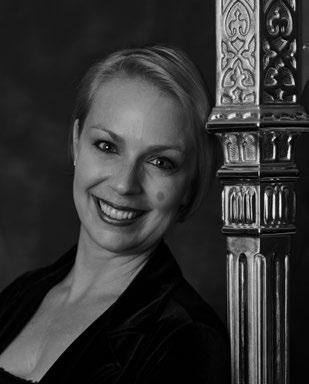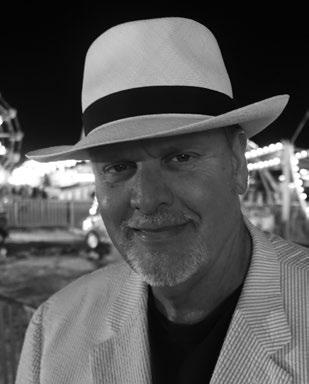THE MUSIC OF THE NUTCRACKER AND A WORLD PREMIERE HARP CONCERTO ANDREW LITTON, conductor
COURTNEY HERSHEY BRESS, harp
Friday, May 12, 2023 at 7:30pm

Saturday, May 13, 2023 at 7:30pm
Sunday, May 14, 2023 at 1:00pm


Boettcher Concert Hall
BERNSTEIN Fancy Free: Three Dance Variations

I. Danzon
II. Waltz
III. Galop
MICHAEL DAUGHERTY Harp of Ages for Solo Harp and Orchestra*
I. Sappho Leaps
II. Sister Juana’s Hymn
III. Uhura’s Song
IV. David’s Prayer
V. Harpo Speaks
VI. Detroit Blue
VII. Irish Wedding — INTERMISSION —
*World Premiere
SOUNDINGS 2022/23 PROGRAM I Sunday'S
iS
concert
dedicated to Helena cHum
CLASSICS 2022/23
PROUDLY SUPPORTED BY
CLASSICS 2022/23
TCHAIKOVSKY The Nutcracker, Op. 71: Act II
X. Scena-Confiturembourg
XI. Scena
XII. Divertissement
a. Chocolate (Spanish)
b. Coffee (Arab Dance)
c. Tea (Chinese Dance)
d. Trepak (Russian Dance)
e. Mirlitons
f. Mother Ginger
XIII. Waltz of the Flowers
XIV. Pas de deux
Variation I (Tarantella)
Variation II (Sugar Plum Fairy)
Coda
XV. Waltz
Apotheosis
CONCERT RUN TIME IS APPROXIMATELY 1 HOUR AND 37 MINUTES WITH A 20 MINUTE INTERMISSION
PROGRAM II COLORADOSYMPHONY.ORG
CLASSICS BIOGRAPHIES
ANDREW LITTON, conductor

Andrew Litton is Music Director of the New York City Ballet. He is also Conductor Laureate of the Bournemouth Symphony Orchestra and Music Director Laureate of Norway’s Bergen Philharmonic. Under his leadership the Bergen Philharmonic gained international recognition through extensive recording and touring, making debuts at the BBC Proms, at Amsterdam’s Concertgebouw, and appearances at Vienna’s Musikverein, Berlin’s Philharmonie, and New York’s Carnegie Hall. For his work with the Bergen Philharmonic, Norway’s King Harald V knighted him with the Norwegian Royal Order of Merit.
Andrew was Principal Conductor of the Bournemouth Symphony Orchestra from 1988-1994. During this time, he led the orchestra on their first American tour and produced 14 recordings, including the Grammy-winning Belshazzar’s Feast. As Music Director of the Dallas Symphony Orchestra from 1994-2006, he hired over one third of the players, led the orchestra on three major European tours, appeared four times at Carnegie Hall, created a children’s television series broadcast nationally and in widespread use in school curricula, produced 28 recordings, and helped raise the orchestra’s endowment from $19 million to $100 million. He regularly guest conducts leading orchestras and opera companies around the globe and adds to his discography of over 130 recordings, which have garnered America’s Grammy Award, France’s Diapason d’Or and other honours.
In addition to conducting over 30 ballets at the New York City Ballet, Andrew returns regularly to the Singapore Symphony Orchestra (where he is a former Principal Guest Conductor) Bournemouth Symphony Orchestra and Bergen Philharmonic Orchestra, and guest conducts with a wide range of international orchestras - recent and forthcoming highlights including the BBC Symphony Orchestra, English Chamber Orchestra, City of Birmingham Symphony Orchestra, Tokyo Metropolitan Symphony Orchestra, Deutsches Symphonie-Orchester Berlin, Dallas Symphony, Colorado Symphony, Adelaide Symphony Orchestra, Orquesta Sinfonica de Galicia, and the Royal Swedish Orchestra.
An avid opera conductor with a keen theatrical sense, Andrew has led major opera companies throughout the world, including the Metropolitan Opera, Royal Opera Covent Garden, Australian Opera and Deutsche Oper Berlin. In Norway, he was key to founding the Bergen National Opera, where he led numerous critically acclaimed performances. He often conducts semi-staged opera programmes with symphony orchestras. During his 14-year tenure as Artistic Director of the Minnesota Orchestra Sommerfest, he concluded the festival with sold-out performances of Salomé, Der Rosenkavalier, Madama Butterfly, La Bohème, Tosca, Rigoletto, La Traviata and others. He conducted the BBC National Orchestra of Wales at the 2021 BBC Cardiff Singer of the World competition.
Andrew’s work with New York City Ballet has earned praise from critics, dancers, and audiences, bringing new prominence to the Ballet’s orchestra. He began his ballet work while still a Juilliard
SOUNDINGS 2022/23 PROGRAM III
PHOTO: DANNY TURNER
CLASSICS BIOGRAPHIES
student, performing as on-stage pianist for Rudolf Nureyev, Natalia Makarova, and Cynthia Gregory.
An accomplished pianist, Andrew often performs as piano soloist, conducting from the keyboard, most recently Beethoven’s Triple Concerto in Singapore. An acknowledged expert on George Gershwin, he has performed and recorded Gershwin widely as both pianist and conductor and serves as Advisor to the University of Michigan Gershwin Archives. After leading the Covent Garden debut of Porgy and Bess, Andrew arranged his own concert suite of the work, which is now performed around the world. In 2014 he released his first solo piano album, A Tribute to Oscar Peterson, a testimony to his passion for jazz, particularly the music of that great pianist. Andrew’s Dallas Symphony Rachmaninov Piano Concerto recordings with Stephen Hough, widely hailed as the best since the composer’s own, won the Classical Brits/BBC Critics Award. He also received a Grammy nomination for his recording of Sondheim’s Sweeney Todd with the New York Philharmonic and Patti Lupone.
Born in New York City, Andrew graduated from the Fieldston School and earned both Bachelor’s and Master’s degrees from The Juilliard School in Piano and Conducting. He served as assistant conductor at La Scala and at the National Symphony under Rostropovich. His many honours in addition to Norway’s Order of Merit include Yale’s Sanford Medal, the Elgar Society Medal, and an Honorary Doctorate from the University of Bournemouth.
For further information, visit andrewlitton.com.
PROGRAM IV COLORADOSYMPHONY.ORG



2023/24 TICKET PACKAGES AVAILABLE NOW!
CENTENNIAL
OUR STATE YOUR SYM HONY
CLASSICS BIOGRAPHIES
COURTNEY HERSHEY BRESS, harp
Courtney Hershey Bress joined the Colorado Symphony as Principal Harp in 2001, after a celebrated freelance career that took her all over the world. Her travels took her to engagements in Asia with the Singapore Symphony Orchestra, in the United States with the Chicago Symphony Orchestra and, as Principal Harpist with the United States Army Field Band as soloist and as part of the ensemble, on tour to the 48 continental states. She has been Principal Harpist of the Cabrillo Festival of Contemporary Music and guest Principal Harpist with the Baltimore Symphony. She has played with the Grand Teton Music Festival, the Strings Music Festival and as a guest artist with the Colorado College Summer Music Festival.
Ms. Bress was chosen and performed for the American Harp Society and the World Harp Congress. She will be the soloist in the world premiere of Michael Daugherty’s harp concerto in May 2023, a piece commissioned by Ms. Bress and the Colorado Symphony.
Ms. Bress is also an active teacher in master classes around the country and in her private teaching studio. She is Adjunct Professor of Harp at Lamont School of Music, University of Denver; Harp Instructor for the Lamont Summer Academy; and Lecturer of Harp at the University of Wyoming. She was Assistant Professor of Harp at Colorado State University from 2016–2021 and has been visiting Professor of Harp at the Eastman School of Music.

Ms. Bress is the author of the book For Love of the Harp, published by Veritas Musica Publishing. The book gives advice to young musicians and relates stories about her career, then provides a guide to arranging and composing music for the harp.
Ms. Bress was a 2005 GRAMMY® nominee for her performance of Ancient Voices of Children by George Crumb. She is a member of the internationally renowned flute, horn and harp chamber group, Trio Arcadia. Her performances can be heard on recordings with the Colorado Symphony, Baltimore Symphony, the U.S. Army Field Band, and on recordings on the Naxos, Bridge, and Albany labels. Her duo album, Night Music and Fantasies, with violinist, Andrés Cárdenes, was released in December 2022.
Ms. Bress earned a Bachelor of Music degree and the Performer’s Certificate from the Eastman School of Music and received her Master of Music in Orchestral Studies from the Chicago College of Performing Arts, Roosevelt University. Her teachers include Kathleen Bride, Sarah Bullen, and Gretchen Van Hoesen. Ms. Bress is performing on a Lyon & Healy Style 3 Gold harp.
PROGRAM VI COLORADOSYMPHONY.ORG
CLASSICS BIOGRAPHIES
MICHAEL DAUGHERTY, composer

Multi-GRAMMY Award-winning composer Michael Daugherty was born in Cedar Rapids, Iowa in 1954. He grew up in a musical household, with a father who played the drums in dance bands and a mother who sang in musical theater productions. Daugherty is the oldest of five brothers, all professional musicians. As a youth he played jazz and classical piano and he was the leader, arranger and organist of the Soul Company, an eight-member rock, soul and funk band that performed throughout Iowa. From 1972-76, he completed an undergraduate music degree in composition at North Texas State University. From 1976-79, Daugherty continued his studies as a composer at the Manhattan School of Music in New York City by day, and as an usher at Carnegie Hall by night.
Invited by Pierre Boulez to be a composition fellow at IRCAM in Paris, Daugherty composed computer music and met many of Europe’s most eminent avant-garde composers, such as Luciano Berio. From 1980 to 1982, he continued his professional training at the Yale School of Music with composers Earle Brown, Jacob Druckman, Bernard Rands and Roger Reynolds. During this time he also collaborated with jazz arranger Gil Evans in New York. In the summer of 1981, he was a Composition Fellow at Tanglewood where he worked with Leonard Bernstein. From 1982 to 1984, Daugherty was invited to study in Hamburg, Germany with composer György Ligeti, who encouraged him to integrate his expertise in American popular music with contemporary concert music.
After receiving his Doctor of Musical Arts degree from Yale in 1986, Daugherty taught composition at the Oberlin Conservatory at Oberlin, Ohio. During this time Daugherty developed his distinctive compositional language, which fuses elements of jazz, rock, popular and contemporary music with the techniques of traditional classical idioms in a manner that Musical America described as “eclecticism at its best.” Since 1991, Daugherty has been Professor of Composition at the University of Michigan, where he is a mentor to many of today’s most talented young composers.
Daugherty’s music has received six GRAMMY Awards, including Best Contemporary Classical Composition in 2010 for Deus ex Machina for piano and orchestra and in 2016 for Tales of Hemingway for cello and orchestra. Daugherty is also a frequent guest of professional orchestras, festivals, universities and conservatories around the world. In 2021-2022, Daugherty was Composer-in-Residence with the Colorado Symphony; his additional residencies include the Detroit Symphony, Louisville Symphony Orchestra, Cabrillo Festival of Contemporary Music, Pacific Symphony and Albany Symphony among others.
Recent commissions include a violin concerto inspired by Amelia Earhart for violinist Anne Akiko Meyers entitled Blue Electra premiered at the Kennedy Center with the National Symphony Orchestra, Fifteen: Inspired by the Art of Andy Warhol for the Pittsburgh Symphony Orchestra and new work for wind ensemble entitled The Adventures of Jesse Owens for the National Intercollegiate Band.
SOUNDINGS 2022/23 PROGRAM VII
COLORADOSYMPHONY.ORG
18-19 THU-FRI 7:30
MAY
CLASSICS PROGRAM NOTES
LEONARD BERNSTEIN (1918-1990)
Three Dance Variations from Fancy Free Leonard Bernstein was born August 25, 1918 in Lawrence, Massachusetts, and died October 14, 1990 in New York City. The ballet Fancy Free was composed in 1944 and premiered on April 18, 1944 by the American Ballet Theatre in New York, conducted by the composer. The score calls for pairs of flutes, oboes, clarinets and bassoons, four horns, three trumpets, three trombones, tuba, timpani, percussion, piano and strings. Duration is about 7 minutes. This the premiere performance by the orchestra.
Leonard Bernstein was just 25 years old when he came to national prominence. On his birthday, August 25, 1943, he was named Assistant Conductor of the New York Philharmonic; on November 14th he substituted at short notice for the ailing Bruno Walter in a nationally broadcast concert that made him an overnight sensation. At that same time, he received a commission from New York’s Ballet Theatre to compose the score for his first ballet, Fancy Free, a production that would also mark the début of Jerome Robbins as a choreographer. Oliver Smith created the decor and Kermit Love designed the costumes. Fancy Free, conducted by the composer, premiered at the Metropolitan Opera House in New York on April 18, 1944. It was a smash. The ballet played 99 times in New York that year, and Bernstein and lyricists Adolf Green and Betty Comden made its premise (though not its music) into the musical On the Town, which opened on Broadway on December 28, 1944. Bernstein derived an orchestral suite from the complete score of the ballet and conducted its first performance with the Pittsburgh Symphony Orchestra on January 14, 1945.
Fancy Free is set in a deserted street in lower Manhattan in 1944. It is night. Three sailors on shore leave burst onto the scene, joking and joshing, ready for fun. They enter a bar and order three beers, but soon return to the street, where a pretty brunette passing by captures their attention. They tease her, she seems interested, and two of the boys strut away on her arms, leaving the third sailor on his own. Just as he heads back into the bar, another girl, an alluring redhead, appears and accepts his invitation to join him for a drink. They dance a Pas de Deux of mounting intensity that signals their mutual attraction. Their reverie is broken by the return of the other sailors with the brunette. The boys learn, without much surprise, that the two girls are old friends. They all stroll into the bar together, where they settle on a dance competition, judged by the girls, to decide which two of the three sailors will have companions for the evening. The first sailor does a boisterous Galop, the second a lyrical Waltz, and the third a sinuous Latin Danzón. The contest settles nothing, however, and the sailors resort to a brawl to decide the matter. The girls stalk out of the bar, and disappear into the night by the time the boys have finished their fight. The trio is suddenly struck by the humor of their situation — they have beaten each other up in vain — and they share a friendly drink before strolling back into the deserted street. A tempting blonde saunters by. The boys hesitate for only a moment before following her off into the city lights.
SOUNDINGS 2022/23 PROGRAM IX
CLASSICS PROGRAM NOTES
MICHAEL DAUGHERTY (born in 1954)
Harp of Ages for Solo Harp and Orchestra
Michael Daugherty was born on April 28, 1954 in Cedar Rapids, Iowa. The score calls for piccolo, flute, oboe, English horn, bassoon, contrabassoon, two horns, two trumpets, percussion and strings. Duration is about 30 minutes. This the premiere performance by the orchestra.
Harp of Ages for Solo Harp and Orchestra (2023) was commissioned by the Colorado Symphony for Principal Harpist Courtney Hershey Bress with support from The Kenneth and Myra Monfort Charitable Foundation.
The composer writes:
The harp is one of the oldest and most beautiful instruments, from early civilizations to the present. Like the seven pedals on the modern harp, my concerto is divided into seven movements that reflect on many ages of the harp. Each movement is also associated with memorable figures associated with the harp:
1. Sappho Leaps — Sappho (7th century BCE): Greek lyric poet who played the harp and, according to ancient lore, leaped from a cliff.
2. Sister Juana’s Hymn — Sor Juana Inés de la Cruz (1648-1695): Mexican nun who became famous as a progressive poet, scholar and composer of music often accompanied by harp.
3. Uhura’s Song — Nyoata Uhura (ca. 23rd century): fictional character from Africa and communications officer on the USS Enterprise, who sang and played the harp on the original “Star Trek” television series (1964-1967).
4. David’s Prayer — David (ca. 1,000 BCE): young shepherd from the Old Testament who played the harp to soothe the spirits of King Saul.
5. Harpo Speaks — Harpo Marx (1888-1954): mute member of the Marx Brothers comedy team who played the harp in their numerous Hollywood films of the 1930s and 1940s
6. Detroit Blue — Dorothy Ashby (1932-1986) and Alice Coltrane (1937-2007): innovators of the jazz harp from Detroit, Michigan.
7. Irish Wedding — Since the 13th century, the Irish harp has been associated with songs of war, dance and weddings. As the heraldic symbol of Ireland, the harp has been championed by Irish harpists from Turlough O’ Carolan (d. 1738) to Mary O’Hara (b. 1935).
PYOTR ILYICH TCHAIKOVSKY (1840-1893)
Act II from The Nutcracker, Op. 71
Pyotr Ilyich Tchaikovsky was born May 7, 1840 in Votkinsk, Russia, and died November 6, 1893 in St. Petersburg. The Nutcracker was composed in 1891-1892 and premiered on December 18, 1892 in St. Petersburg, conducted by Riccardo Drigo. The score calls for piccolo, two flutes, two oboes, English horn, two clarinets, bass clarinet, two bassoons, four horns, two trumpets, three trombones, tuba, timpani, percussion, two harps, celeste and strings. Duration of Act II is about 45 minutes. This the premiere performance by the orchestra.
Late in 1890, Tchaikovsky was approached by Prince Ivan Vselvolozhsky, director of the Imperial Theater in St. Petersburg, and Marius Petipa, the French dancer and choreographer who created
PROGRAM X COLORADOSYMPHONY.ORG
CLASSICS PROGRAM NOTES
an unprecedented standard of ballet production and execution after settling in Russia in 1847, to compose a full evening’s entertainment — a one-act opera and a ballet. The subject for the opera was to be of Tchaikovsky’s choice (he picked King René’s Daughter by the Danish dramatist Hendrik Herz, which the composer’s brother Modest turned into a libretto titled Iolanthe), but that for the ballet was specified as E.T.A. Hoffmann’s story of The Nutcracker and the Mouse King, one of the most popular tales in Russia at the time. Tchaikovsky had read Hoffmann’s Nutcracker in 1882 “with great pleasure,” and he accepted the commission.
Just as he was undertaking The Nutcracker in February 1891, Tchaikovsky was invited to the United States to conduct his music at the festivities celebrating the opening of Carnegie Hall in New York City. He agreed to go, and had to put aside the score of the gestating ballet until he returned home in May. He finished his sketch by the end of the following month, though not without the misgivings he usually expressed over his new works. “The ballet is infinitely worse than The Sleeping Beauty, that much is certain,” he lamented to his brother Modest. ”Let’s see how the opera will turn out.” Like the true professional composer he had become, however, he labored on despite his doubts, working on Iolanthe during the fall, and completing the orchestration of The Nutcracker by the following February. With the premiere of the new ballet and opera delayed until December 1892, he conducted some of his new music at a concert in St. Petersburg on March 19th. The suite of eight numbers he extracted from the complete score of the ballet was so successful that five of the movements were immediately encored. The premiere of the full ballet on December 18th, though lavishly mounted, fared less well. Casting changes and the public’s increasing familiarity with subject and score soon led to The Nutcracker’s wide acceptance, however, and it has remained one of the most popular of all ballets.
In Act I, Clara receives a giant Nutcracker as a Christmas gift. When everyone else is in bed, Clara steals back into the living room, where the Nutcracker springs to life and leads a battalion of gingerbread men in battle against an invading army of mice. The Nutcracker is confronted by the Mouse King himself, and he appears about to meet his fate when Clara hurls her slipper at the rodent-monster and kills him. The mice, leaderless, flee, and the Nutcracker is transformed into a gallant Prince. As reward for saving his life, he invites Clara to visit his kingdom. She accepts.
Act II is set in the great hall of the castle, where the Prince describes to the assembled court how Clara saved his life (Clara and the Prince). At a sign from the Sugar-Plum Fairy, a sumptuous banquet appears. Clara is ushered to a miniature throne at the head of the table, and a Divertissement in her honor begins. The first three of the Divertissement’s dances represent the banquet refreshments: a sparkling Spanish bolero depicts Chocolate, a mysterious and exotic Arabian Dance symbolizes Coffee, and a bubbling Chinese Dance illustrates Tea. Next comes a fiery Trepak, the traditional dance of the Russian Cossacks, which serves as a musical foil for the delicate Dance of the Mirlitons, or toy flutes. The Divertissement concludes with a merry depiction of Mother Gigone, also known as the Old Woman Who Lived in a Shoe, and some antics by a group of clowns. The Sugar-Plum Fairy’s retinue pays tribute to Clara in the Waltz of the Flowers. The following Pas de Deux contains the Dance of the Prince and the Sugar-Plum Fairy; the Dance of the Sugar-Plum Fairy; and the Coda, for both partners. In the Final Waltz and Apotheosis, the entire court joins in a grand dance, after which the music that accompanied Clara and the Prince on their arrival at his realm returns as the Sugar-Plum Fairy pays final tribute to the girl who saved the Prince.
©2023 Dr. Richard E. Rodda
SOUNDINGS 2022/23 PROGRAM XI
Stravinsky’s The Rite of Spring with Peter Oundjian

MAY 26-28 FRI-SAT 7:30 ✹ SUN 1:00

C E NT E NN IA L COLORADOSYMPHONY.ORG












